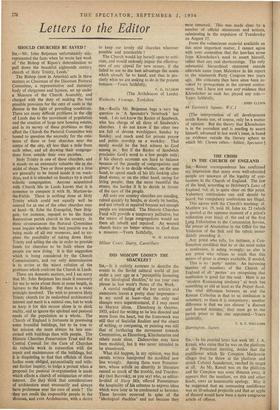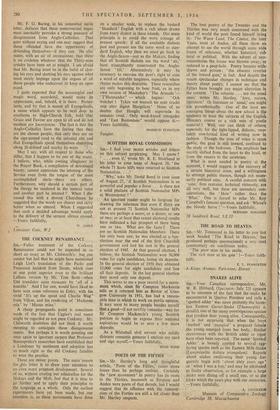Sta,—In his pointed letter last week Mr. J. A. Kcnsit,
who states that he was on the platform at the Protestant meeting, denies that the cauliflower which Sir Compton Mackenzie alleges that he threw at the platform and struck Colonel Saunderson, reached its target at all. As Mr. Kensit was on the platform and Sir Compton was some distance away, it appears that the assailant, on this and other heads, owes an honourable apology. May it be suggested that an unmeaning cauliflower was an ill-selected projectile and that an apple of discord would have been a more congruous article of offence.
Mr. F. G. Baring, in his somewhat naïve letter, declares that these controversial issues must inevitably provoke a strong measure of disagreement from Anglo-Catholics. That goes without saying and one may suggest that those offended have the opportunity of -defending themselves—if they can. He also states, with an air of omniscience, that there is no evidence whatever that the Thirty-nine articles have been set at nought. I am afraid that Mr. Baring must be in the habit of clos- ing his eyes and shutting his ears against what must surely impinge upon the organs of all those people who endeavour to keep an open mind.
I quite expected that the meaningful and magic word, sacerdotal, would make its appearance, and, behold, it is there. Protes- tants, and by that is meant all ENangelicals, a name which appears to be next door to anathema to High-Church folk, hold' that Grace and Favour are open to all and do not mediate per Sacerdotem. The fact is that the Anglo-Catholics have the feeling that they are the chosen people, that only they are on the sign-posted road to the celestial city and that Evangelicals spend themselves stumbling along ill-defined and murky by-ways.
May I say, with all respect to those who differ, that I happen to be one of the many, I believe, who, while owning allegiance to the Prayer Book, a compilation of devotional beauty, cannot appreciate the intoning of the Service even from the tongue of the most accomplished cleric—there are others. Furthermore, why should a certain part of the liturgy be rendered in the natural voice and another part be intoned ? When I dis- cussed this with a devout Churchman he suggested that the words are clearer and carry better when so uttered. When I suggested that such a decided advantage would apply to the delivery of the sermon silence ensued. —Yours faithfully, Lancaster Gate, W.2 W. JAMES



































 Previous page
Previous page